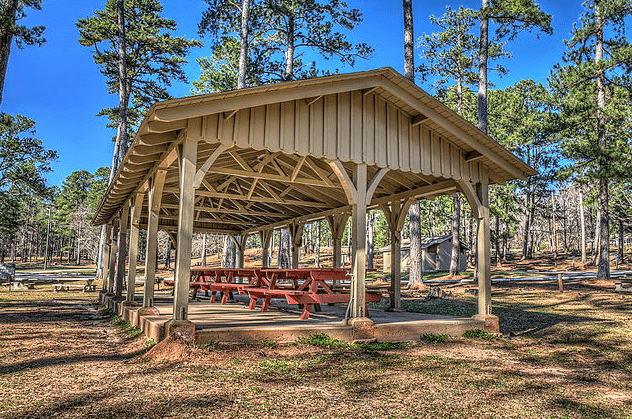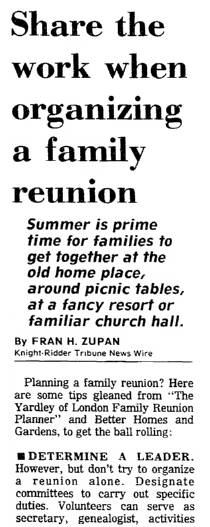Introduction: In this article, Gena Philibert-Ortega provides some suggestions for planning and hosting a family reunion – a great time for genealogists to gather family history information. Gena is a genealogist and author of the book “From the Family Kitchen.”
It’s that time of the year! Families often hold reunions in the summer – a great time for family fun. What will your family do? Some family reunions are small, quickly planned gatherings over a meal – but planning for others may take longer in order to coordinate the schedules and interests of 100 people or more. No matter what type of get-together you’re planning, here are some ideas to consider for your own family reunion.

Time
The most obvious part of planning a reunion is the most important: when will the reunion take place? The answer depends on how many people are coming, from how far away, and their schedules – as well as the schedule of the host and the facility where the reunion will take place. Many families plan at least a year in advance and need to take into consideration family work schedules, children’s school schedules, and reservations or deposits that need to be made. This is especially crucial for a larger family reunion where you may need a dozen or more hotel rooms put aside.
In addition to the date/s it will take place, what days of the week will the reunion span? Will it just be a dinner, a one-day get-together, or a series of events that last over a long weekend? Your answer will dictate the money spent by those attending, food and lodging needs, as well as activities planned. You may also need to charge a fee to cover food, the facility, or even mementos like family reunion t-shirts. But remember, as this newspaper article on family reunion tips points out: the lower the cost of the event, the better the attendance.

Host
Planning a family dinner is much different than holding a reunion for 100 people – which is more like putting on an event for work or church. Who will host your reunion? This person, hopefully with others assisting, needs to make the final decision about things like the program, deposits that need to be made, and negotiating hotel rooms and meeting rooms. Ideally, the host should be someone who lives near where the event is being held.
If you are the host, don’t keep all the work to yourself. Enlist a committee or at least helpers that can assist with tasks to make the job easier. Break up those tasks into planning tasks (checking out hotels, finalizing menus, ordering t-shirts, planning events, sending out emails) and on-site tasks (like trash detail, assisting with the food, gathering everyone together, helping with activities).
Place
Where will the reunion be held? A small get-together lasting just a few hours might be held at someone’s home or a local restaurant, but what about a larger and longer gathering? Campgrounds, hotels, resorts, and even a cruise might be possibilities. A “destination location” might ensure that people can not only attend the reunion but incorporate it into their vacation plans.
Each of these types of facilities have their benefits – for example a family reunion aboard a cruise ship means not worrying about food at all since that is covered in your cruise fee, and there may be planned activities for children available through the cruise line’s “kid’s club.”
If a hotel or resort is involved, what amenities does that facility have? Summer reunions with lots of kids might benefit from a hotel with a pool. Hotels that offer a free breakfast might help families save money. Conference room space will be helpful for dinners or meetings you have planned. Consider the space needed to allow family members a place to gather to visit, participate in activities, or just relax.
Activities for All Ages
Who will be at the reunion? Take into consideration activities that appeal to multiple age groups. I recently received an email survey from the host of a 2018 family reunion. Questions about activities included kids’ ages, possible family history class topics, and what types of outdoor activities would be of interest. A survey is a great way to gauge what activities will have broad appeal. A survey provides the host with an opportunity to understand the needs of those who are attending and make sure that there is something of interest for all attendees.
Need some ideas for your family reunion? Some activities to consider:
- Outdoor activities like hikes, soccer or football games, Frisbee
- Scavenger hunts
- Movie night
- Board games
- Water balloons, swimming, boating
- Field trip to a local attraction
- Craft area
Genealogy
What’s a family reunion without genealogy? For genealogists, a family reunion is a great opportunity to ask questions, take photos, and learn more about the family tree. As you plan, consider activities that will help to better understand your shared ancestors and their lives. Some activities include:
- Plan the reunion (or a field trip to) where your ancestors lived, or places where significant family events took place (school, church, work, Civil War battlefield, etc.).
- Invite family to bring their oldest photos and hold a scan-a-thon.
- Bring Family Group Sheets for everyone to fill out.
- Provide everyone a Pedigree Chart.
- Play Ancestor Bingo (make Bingo cards substituting ancestral photos or names for numbers).
- Play a slide show (PowerPoint or Keynote) of photos and documents.
- Provide a short presentation about your ancestors.
- Have a display of family heirlooms.
- Set up an interview area where you can interview family, or kids can interview their parents and other relatives about their lives and their ancestors. Provide a set of interview questions, a place to sit, and a means to record (audio or video).
- Hang up a descendent wall chart and ask people to locate their name. Provide colored markers and pens to add comments, corrections, and additions.
- Prior to the reunion, provide family with recipe cards and invite them to bring family recipes to be shared and/or compiled in a cookbook.
Food
Here’s the most important family reunion question: what will you eat? A dinner or lunch is one thing, but a weekend reunion for a large group means at least six meals plus snacks. You may decide on making some of those meals communal. Will meals be catered or potluck? Will there be restrictions on food if your reunion is in a hotel? (If the hotel has a restaurant, they may not allow outside food.) Is a potluck an option if the majority of families are traveling a long distance? If you decide on providing a potluck, you also should consider any serious food allergies.
Tradition
What family reunion traditions do you have? If you don’t currently have any, why not start something? One tradition my friend’s family has is to end their reunions with a memorial service for those family members who have died. Remembering those who are no longer there is a fitting way to end a reunion weekend, and a reminder of why the family gathers together.
Next Time
So, what about next time? Your current reunion is the place to announce the date and host for the next reunion. And lastly, remember that the reunion doesn’t end when the last family leaves for home. After the reunion, take some time to sit down and go over what went well and what changes you would make. Then provide that information to the next host so that they can plan the next family reunion to remember.
Related Articles:
